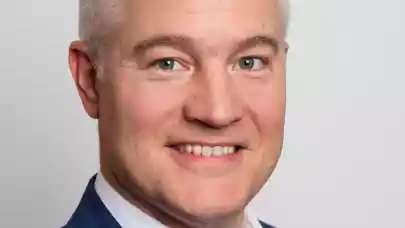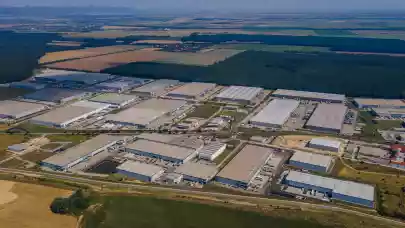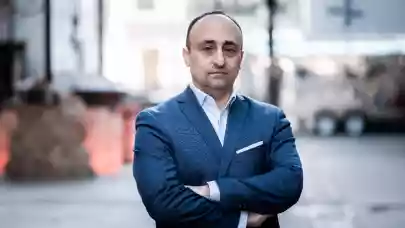
The pan-European developer, which entered the Hungarian market a relatively short time ago, sees a lot of opportunities in the countryside to build logistics centres for different end-users. Property Forum asked László Kemenes, Managing Director of the Hungarian branch about the company's plan for expansion and tackling the current general difficulties in the property industry.
Buying a substantial amount of development land is crucial for a newcomer to the Hungarian market such as Panattoni. How big is your land bank at the moment?
We acquired 2 land plots at the end of last year in the Western submarket of the Greater Budapest area that allows for the development of over 90,000 sqm of space in total. We will start construction of our City project in Törökbálint in June for 18,000 sqm of small business units and deliver them in the first quarter of 2023. This development focuses on occupiers seeking high-quality space in a smaller size, located very close to the city of Budapest. Units will be available from 1,200 sqm and tenants can have dedicated buildings for their operations.
We are also preparing our Herceghalom site for development to commence construction of the first building. This development will offer space for larger requirements, up to even 70,000 sqm. In addition to the two acquired land, we are working on multiple land opportunities in various locations around Budapest and the country.

László Kemenes
Managing Director Hungary
Panattoni
Will you concentrate on Budapest and its surroundings only or try to explore some secondary destinations in regional hubs?
We are focusing on all the locations in Hungary that present development opportunities for us. We see strong demand from occupiers in the Greater Budapest area, as well as in larger countryside towns, especially in which major industrial (automotive, electronics, etc.) investments have taken, or will take place. Our goal is to provide opportunities for occupiers in multiple locations, for every type of occupancy structure (spec, BTS. or BTO), and in various sizes.
BTS is very popular in some markets of Panattoni, especially in Poland. Is there a similar chance to start such projects in Hungary too?
The Polish industrial market is different from the Hungarian one in several aspects. Size, maturity, number of locations and market players, etc. Hungary has not typically been a BTS or pre-lease market for industrial developments, however, there has been a noticeable change in that over the past 2 to 3 years. Most of the occupiers with larger requirements are planning their expansions or new projects well in advance, and also, they have trust in local developers to sign more pre-lease or BTS agreements. So, I believe there is a good chance to secure such projects in the market going forward.
How can you cope with skyrocketing development costs which don’t seem to be cooling down in the short run?
This is probably the biggest challenge for every developer in the real estate industry currently, regardless of the sector. We try to manage the construction cost implications by creating strategic partnerships with our suppliers, as well as we pay even more attention to value engineering. Taking a broader view, there are several factors influencing real estate developments to a greater extent these days. Increasing construction costs, land prices, interest rates, and energy prices all put pressure on the development costs eventually. Even if there are some positive signs for those to consolidate on a micro level, on a regional basis they do not seem to be trending back to the levels we experienced in the past years. This eventually will be reflected in the rental terms, but since demand is still strong for industrial properties, we believe the success story of the asset class will continue in the long term.
In terms of demand, do you see more interest from companies that are involved in light industrial activity within an industrial park? Or do you think warehousing and logistics will dominate the market?
We see demand from all these sectors. E-commerce is a huge driver of demand in the CEE region and it will continue to increase in Hungary also. As a result of the pandemic and the war in Ukraine, there are a lot of initiatives for nearshoring and supply chain reconfigurations to relocate production closer to the customers to allow operation continuity and shorter delivery times. CEE and Hungary will benefit from these, as more space will be required by the manufacturers and logistics companies in these locations.
Today flexible space is a common expression mainly in the office sector. How do you prepare your warehouse and logistics centers to meet the ever-changing needs of your tenants?
As mentioned, our goal is to provide a solution for all kinds of requirements, regardless of size, location, and type of occupancy (spec, BTS, or BTO). We have identified multiple development opportunities that we can offer to our customers on a tailored basis. “Expansion” is probably the most common flexibility requirement of customers these days and we are managing that by securing sufficient land to accommodate these needs.
Sustainability has become a major driver in our industry as well. What kind of steps will be observed to reach that goal when Panattoni will accelerate its speed of development in Hungary?
We constantly try to improve our sustainability strategy, and ESG is a major part of that. We are certifying all our buildings and we are working towards becoming carbon-neutral in our constructions. It is indisputable that the value of certified buildings is substantially higher than non-certified ones, so building sustainably has a positive impact on the returns as well.



